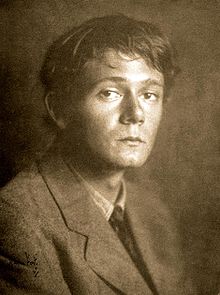Clark Ashton Smith

Clark Ashton Smith (ur. 13 stycznia 1893 r., zm. 14 sierpnia 1961) – amerykański poeta, rzeźbiarz, malarz, autor fantasy, horroru i krótkich opowiadań science-fiction. Dzięki tym historiom oraz znajomości z H.P. Lovecraftem, trwającej od 1922 do śmierci Lovecrafta, jest dzisiaj pamiętany. Razem z Lovecraftem i Robertem E. Howardem pozostaje jednym z najbardziej znanych współpracowników magazynu Weird Tales publikującego horrory. Przez całe życie cierpiał na problemy ze wzrokiem. Zmarł we śnie 14 sierpnia 1961 roku. Większość życia był biedny i chwytał się różnych robót: zrywał owoce, był drwalem.
Smith napisał większość swoich horrorów i Mitów Cthulhu zainspirowany twórczością H.P. Lovecrafta. Potwory i kreatury, które wymyślił to m.in.: Aforgomon, Rlim-Shaikorth, Mordiggian, Tsathoggua, czarnoksiężnik Eibon i kilka innych. Jego opowiadania początkowo pojawiały się w magazynach: Weird Tales, Strange Tales, Astounding Stories, Stirring Science Stories and Wonder Stories. Wiele opowiadań zostało opublikowanych w sześciu książkach w wydawnictwie Augusta Derletha „Arkham House”. Niektóre były opublikowane także jako Lost Worlds Vols 1 and 2 (LW1 and LW2):
- „The Last Incantation” – Weird Tales, June 1930 LW2
- „A Voyage to Sfanomoe” – Weird Tales, August 1931 LW2
- „The Tale of Satampra Zeiros” – Weird Tales November 1931 LW2
- „The Door to Saturn” – Strange Tales, January 1932 LW2
- „The Planet of the Dead” – Weird Tales, March 1932 LW2
- „The Gorgon” – Weird Tales, April 1932 LW2
- „The Letter from Mohaun Los” (under the title of „Flight into Super-Time”) – Wonder Stories, August 1932 LW1
- „The Empire of the Necromancers” – Weird Tales, September 1932 LW1
- „The Hunters from Beyond” – Strange Tales, October 1932 LW1
- „The Isle of the Torturers” – Weird Tales, March 1933 LW1
- „The Light from Beyond” – Wonder Stories, April 1933 LW1
- „The Beast of Averoigne” – Weird Tales, May 1933 LW1
- „The Holiness of Azedarac” – Weird Tales, November 1933 LW1
- „The Demon of the Flower” – Astounding Stories, December 1933 LW2
- „The Death of Malygris” – Weird Tales, April 1934 LW2
- „The Plutonium Drug” – Amazing Stories, September 1934 LW2
- „The Seven Geases” – Weird Tales, October 1934 LW2
- „Xeethra” – Weird Tales, December 1934 LW1
- „The Flower-Women” – Weird Tales, May 1935 LW2
- „The Treader of the Dust” – Weird Tales, August 1935 LW1
- „Necromancy in Naat” – Weird Tales, July 1936 LW1
- „The Maze of Maal Dweb” – Weird Tales, October 1938 LW2
- „The Coming of the White Worm” – Stirring Science Stories, April 1941 LW2
Jako poeta wydał między innymi tomiki The Star-Treader and Other Poems, Odes and Sonnets, Ebony and Crystal i Sandalwood. Za jego sztandarowy wiersz uchodzi utwór The Hashish Eater, Or The Apocalypse Of Evil[1].
Zobacz też
[edytuj | edytuj kod]Przypisy
[edytuj | edytuj kod]- ↑ Brian Stableford: Narrative Strategies in Science Fiction and Other Essays on Imaginative Fiction. books.google.pl, 2002. s. 143. [dostęp 2017-02-11]. (ang.).
Linki zewnętrzne
[edytuj | edytuj kod]- http://www.eldritchdark.com/ - strona zawiera większość opowiadań Smitha (po angielsku).
- ISNI: 0000000119471097
- VIAF: 86145857791723020473
- LCCN: n79041874
- GND: 119404435
- NDL: 00456896
- BnF: 11925015h
- SUDOC: 027141683
- SBN: CFIV009967
- NLA: 50002884
- NKC: xx0128077
- BNE: XX830606
- NTA: 069631867
- BIBSYS: 12064567
- CiNii: DA03777422
- Open Library: OL951926A
- PLWABN: 9810576022105606
- NUKAT: n95211397
- PTBNP: 1461471
- LNB: 000298380
- NSK: 000674083
Ε Β Ε : 321988- KRNLK: KAC201504776
